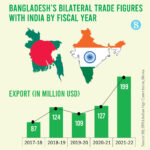India has now Slapped fresh trade restrictions on Bangladeshi exports through its northeastern land ports in a move that could severly impact Dhaka’s multi-million dollar garment industry.
The decision comes in he wake of controversial remarks made by Bangladesh’s intering chief advisor Muhammad Yunus in China where he described India’s northeast as a lawn a landlocked region with no ocean access and calling these comments diplomatically insensitive. Indian officials say the move aims to ensure reciprocity in trade and correct the longstanding imbalance. From now on, all Bangladeshi goods including ready-made garments, food items furniture and plastics, they’re going to be rerouted through Kolkata or Navashva ports, substantially increasing the transportation and logistical costs. The northeastern states Assam, Megalia, Tripura and and Misoram will now see tightened import flows potentially opening new doors for local indian manufactures.

India has issued a new trade directive sharply limiting the entry of Bangladeshi readymade garments which is a critical export for Bangladesh to only two indian ports that is in Kolkata and in Mumbai.
The move closes all land ports that have been used for these imports which are worth over $700 million dollars annualy signaling a drastic shift in India’s trade policy.
This major trade policy change by India could have long-term consequences for both countries, especially for Bangladesh’s economy which heavily depends on exports. Among all of Bangladesh’s exports, the ready-made garment (RMG) industry is the most important. It contributes a large part to the country’s economy and employs millions of workers, especially women. By restricting these garment exports to only two ports – Kolkata and Mumbai – India has created a big challenge for Bangladeshi businesses.
Before this new restriction, Bangladesh used many land ports across India’s northeastern states like Assam, Meghalaya, Tripura, and Mizoram to send goods. These ports were closer to Bangladesh and helped save time and money on transport. Now that these routes are blocked, exporters will need to send their goods on much longer routes, passing through Kolkata or Mumbai.
This change will increase transportation time, raise fuel and logistic costs, and create delays, which can affect the delivery of goods. These changes may also make Bangladeshi products more expensive and less competitive in the Indian market.

The background of this issue goes beyond just trade. It also has a political and diplomatic angle. The trigger for this action seems to be a statement made by Muhammad Yunus, the interim chief advisor of Bangladesh, during his visit to China. His comment referring to India’s northeast as a “lawn” and a “landlocked region” with “no access to the ocean” was not taken well by Indian authorities.
Many in India saw it as a disrespectful and diplomatically insensitive remark. The timing of India’s new trade policy right after this comment has led to debates on whether this is a form of political retaliation or a genuine correction of trade rules.
Indian officials, however, insist that this move is not just about one comment. They argue that the trade relationship between the two countries has been unbalanced for years.
India claims that Bangladesh has been putting higher tariffs and restrictions on Indian products, especially those going to Bangladesh’s northeastern border areas. India says it is only asking for fairness and balance in trade.
In simple terms, they say that if Bangladesh is not treating Indian goods equally, then India has the right to take similar actions.
Some Indian business communities in the northeast have welcomed this decision. They believe that closing the land ports to Bangladeshi goods will reduce competition for local products. This may give more space for Indian manufacturers to grow and sell their goods. The move may also help boost production in these remote states and create jobs for local people. On the other hand, businesses that rely on imported Bangladeshi goods may suffer due to higher prices and delays.
In Bangladesh, the reaction has been mixed. Many exporters are shocked and worried. They fear losing one of their most important markets. The RMG sector in Bangladesh earns billions of dollars in exports every year, and India is a key partner.
Now, they will need to look for new ways to maintain their business with India. Some industry leaders in Bangladesh have asked their government to hold diplomatic talks with India and resolve the issue quickly.
This is not the first time trade ties between India and Bangladesh have come under stress. Over the years, there have been several disputes over border trade, tariffs, and transport routes. However, both countries have also worked together on many occasions to improve trade and cooperation. For example, India has helped Bangladesh with electricity, transport links, and even provided vaccines during the COVID-19 pandemic.

Many experts believe that despite the current tensions, both nations must try to maintain friendly relations. Bangladesh is India’s important neighbor and partner in South Asia.
Strong trade and political cooperation can benefit both sides. Solving disputes through dialogue is always better than taking tough actions that hurt businesses and ordinary people.
The new trade rule is a reminder of how sensitive international relations can be. A single comment or disagreement can lead to major changes that affect the economy, businesses, and people’s livelihoods. Moving forward, both countries need to think carefully and try to understand each other’s concerns.
It’s also important for leaders and officials to use respectful and thoughtful language when speaking about neighbors and allies.
In conclusion, India’s decision to reroute Bangladeshi exports through only two ports is a significant move. While Indian officials say it is a fair correction in trade practices, many believe it is a response to recent diplomatic tensions. Whatever the reason, the impact will be felt on both sides of the border. Bangladesh’s garment industry will face new hurdles, and Indian importers will also need to adjust.
The coming months will be important to see if both governments can resolve this matter and bring stability back to their trade relationship.
